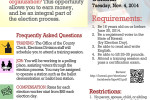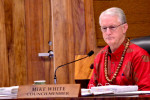Published in The Maui News, April 17, 2016
By MIKE WHITE , The Maui News
Now is the time for each of us to call and email our state legislators and ask that counties receive a fair share of revenue from the transient accommodations tax.
While keeping an ever-increasing portion of the TAT for itself, the State of Hawaii has placed an arbitrary cap on the counties’ share of TAT revenue, currently at $103 million per year. Since 2007, the state’s annual share has increased from $8.3 million to more than $205 million as the visitor industry has grown.
The four counties combined, during the same period, have received an increase of a mere $2.2 million, while the collective counties’ expenses for parks, police and fire have gone up by $170 million. It is simply unfair to place the burden of visitor-related expenses onto the backs of residents.
The state House and Senate over the next few weeks will have to agree in conference committee on a distribution of the TAT in Senate Bill 2987. The legislative session ends on May 5.
The four county mayors, the four council chairs and the Hawaii State Association of Counties, led by HSAC President Mike Victorino of Maui County, are working together to eliminate the TAT cap. The county officials point to a report issued by the State-County Functions TAT Working Group.
The working group was created by the Legislature and was composed of both state and county government officials and industry experts. The working group recommended eliminating the cap on the counties’ share of the TAT. It further concluded that fairness dictates the counties receive 45 percent of all available TAT revenue, with the state retaining 55 percent.
Adopting the working group’s recommendation would add more than $13 million for Maui County in the upcoming fiscal year, an increase of more than 57 percent.
The counties actually deserve a larger share, as I’ve previously noted in this space (“Chair’s 3 Minutes,” Dec. 13, 2015). But the Legislature should, at a minimum, follow the advice of its own working group.
While it’s important for state legislators to understand the views of the counties’ elected officials, it’s even more critical for them to hear from our shared constituents. Please make the effort to encourage your state representatives and state senators to support their leadership’s efforts to help resolve this issue with the TAT. You can email them at reps@capitol.hawaii.gov and sens@capitol. hawaii.gov.
The council’s Budget and Finance Committee is conducting daily deliberations on the county’s fiscal year 2017 budget in the Council Chambers throughout the remainder of this month. The committee also meets Monday at 6 p.m. at Helene Hall in Hana and Tuesday at 6:30 p.m. at Lihikai Elementary School in Kahului.
The council conducts a public hearing on the budget on Thursday at 6 p.m. in the Council Chambers. Pursuant to the County Charter, the council has to approve the budget by June 10.
Meanwhile, the council’s Special Committee on County Governance has created a temporary investigative group to recommend three options for a council-county manager system of government for Maui County. The special committee will receive the group’s report on Thursday at 1 p.m. in a meeting in the mayor’s conference room on the ninth floor of the county building.
The special committee must then make its final recommendation to the Maui County Council by June 1. That will give the council enough time to consider placing a proposed charter amendment on the general election ballot.
Mahalo.
* Mike White is chairman of the Maui County Council. He holds the council seat for the Paia-Haiku-Makawao residency area. “Chair’s 3 Minutes” is a weekly column to explain the latest news on county legislative matters. Go to mauicounty.us for more information.







